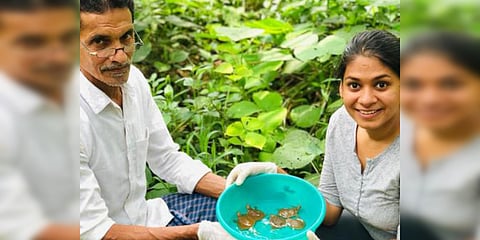

KOCHI: Cantor's Giant Softshell Turtle, also known as Pala Poovan or Bheemanaama, is considered an endangered and highly elusive species worldwide. Its nests and eggs were discovered for the first time in India near the banks of the Payaswini river, Kasargod.
Ayushi Jain, a research affiliate of the Wildlife Institute of India, works with the local community to set up a network that focuses on preserving the nest of Cantor’s for the past two years in the district.
"Though the species were spotted in several parts of Kerala, it was always seen alone, not as a breeding population. Researchers were under the impression that the existing turtles are what is left of the old population. After three nests were discovered along the banks of the Payaswini River, an active nesting was spotted. At this point, it is crucial to conserve the species from extinction," says Ayushi.
The local network consists of 40 key informants and the Forest department. Ayushi was able to discover the turtles’ nest, which was a mystery to the scientific community until now. One of the key informants, Abdullah Kunzhi, a local farmer, sighted the nest near the river bank.
The eggs are being kept safely inside artificial incubators. As the gates of the dam are closing, there will be a rise in water levels along the river bank, which could waterlog the nests. "We found the eggs last year as well, but an entire species that could have generated from the clutch got destroyed due to sand mining, one of the biggest threats to the Cantor’s habitats," adds Ayushi.
The Cantor's are also known as frog-faced softshell, due to their odd facial features and is listed as an endangered species on the IUCN Red List. A project titled 'Status and conservation of Cantor's Giant Softshell Turtle' was conducted in Northern Kerala as part of the EDGE fellowship, (Evolutionary Distinct and Globally Endangered).
With the support of the Zoological Society of London, the National Geographic Photo Ark fellowship, and Mohamed bin Zayed Species Conservation Fund, Ayushi Jain was able to execute the project. Dr Fran Cabada, a marine biologist, Dr Deepak Veerappan, and Dr Abhijit Das were her supervisors
Man-made extinction
Agricultural practices, unscientific dam construction and illegal sand mining reduce the size of the riverbank the turtle’s natural habitat. "Once the habitats are threatened, turtles will not breed anymore. This will result in their extinction. I want to make the community work with the forest department to bring out management practices that are friendly to the Cantor's, even without the intervention of scientists or researchers. Since the nesting was found outside the protected area, where the local communities live, it is their responsibility to act as protectors," she says.
The hooks of the fishing line getting stuck in the mouth cavity of the turtle can also cause their death. Many locals do not know about this, and release the turtles to the water directly. The project also conducted several workshops for the forest department and local communities, teaching them how to rehabilitate the turtles.
Rare Cantor's
Cantor's Giant Softshell Turtle, one of the largest freshwater turtles in the world, is found only in five states in India. It has been spotted in 11 countries, many of which have declared the species to be locally extinct. Cambodia has active conservation programmes for the Cantor's.